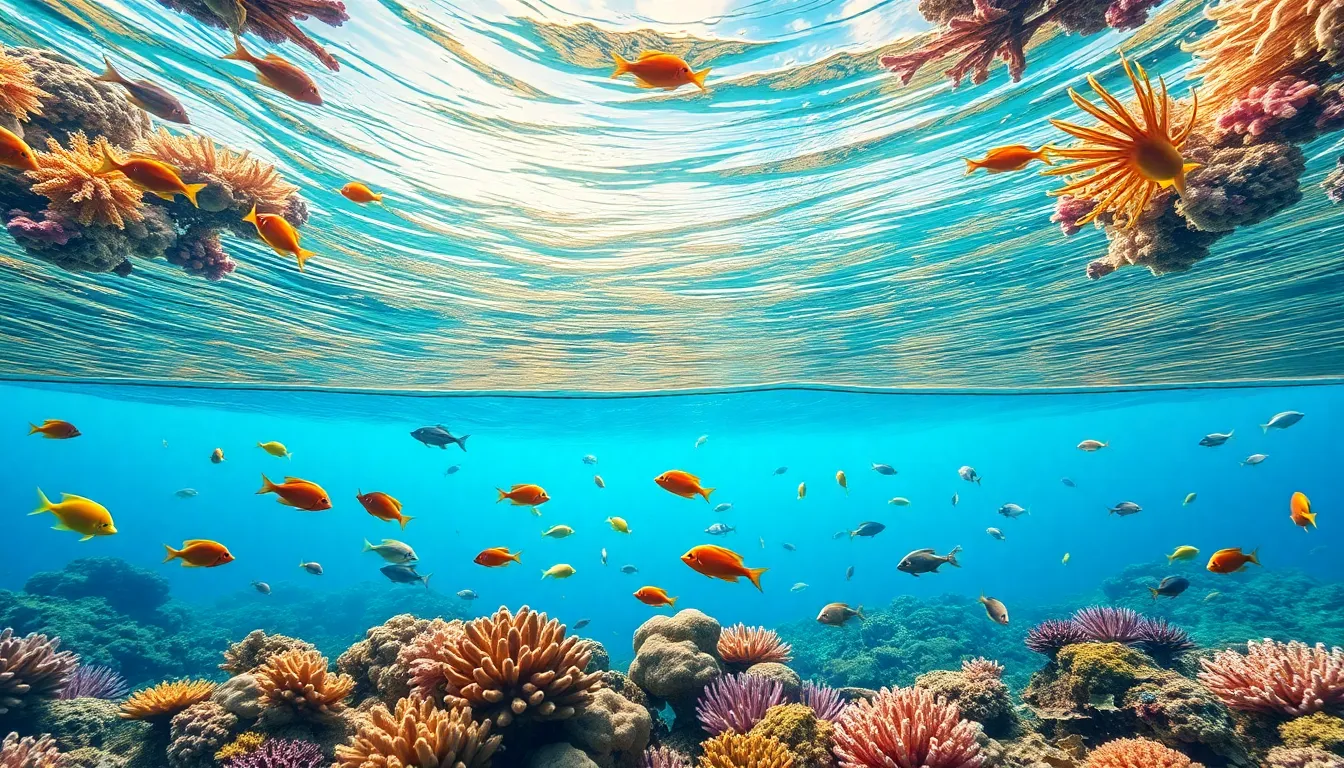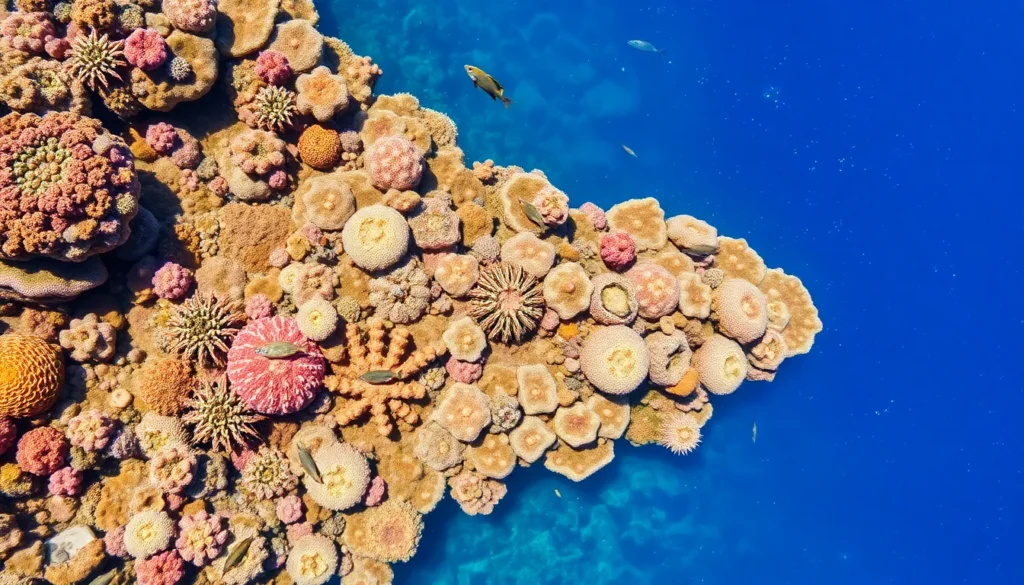Table of Contents
ToggleDive into the mesmerizing world of ocean ecosystems, where vibrant coral reefs dance with colorful fish and mysterious creatures lurk in the depths. These underwater realms aren’t just beautiful; they’re vital to the health of our planet. Think of them as nature’s very own underwater buffet, serving up everything from oxygen to climate regulation.
But wait—it’s not all sunshine and sea turtles. Human activities are throwing a wrench into this delicate balance, and the consequences could be dire. If you’ve ever wondered how your love for sushi might affect a dolphin’s dinner plans, you’re in the right place. Join the exploration of these fascinating ecosystems, and discover why protecting our oceans is the ultimate catch of the day.
Overview of Ocean Ecosystems
Ocean ecosystems cover over 70% of the Earth’s surface and contain diverse habitats. These habitats include coral reefs, mangroves, and deep-sea communities, each providing unique environments for various marine species. Coral reefs stand out as some of the most biologically rich ecosystems, housing roughly 25% of marine life. This biodiversity supports food webs and contributes to global oxygen production.
Marine life relies on these ecosystems for food, shelter, and breeding grounds. Fish, mollusks, crustaceans, and other organisms depend on the stable conditions provided by ocean environments. The interdependent relationships among species maintain ecological balance and overall health.
Human activities pose significant threats to ocean ecosystems. Pollution, overfishing, and climate change disrupt natural processes, often resulting in habitat degradation. For instance, plastic pollution negatively impacts marine animals, entangling them or leading to ingestion of harmful materials. Furthermore, rising water temperatures and acidification threaten coral reefs, causing bleaching events that destabilize marine communities.
Marine ecosystems play a pivotal role in regulating the Earth’s climate. Oceans absorb carbon dioxide and help stabilize temperatures by distributing heat globally. Healthy ocean ecosystems contribute to climate resilience, enabling adaptation to environmental changes.
Protection of ocean ecosystems is crucial for sustainability. Utilizing responsible fishing practices, reducing pollution, and supporting marine conservation initiatives enhance ecosystem resilience. By prioritizing these actions, humanity can ensure the survival of the planet’s ocean health and biodiversity for future generations.
Types of Ocean Ecosystems

Ocean ecosystems encompass a variety of environments, each with distinct characteristics and ecological functions. Understanding these types is essential for effective marine conservation.
Coral Reefs
Coral reefs represent one of the most biodiverse ecosystems on the planet. They support about 25% of all marine species, offering shelter and breeding grounds. Various coral species, such as stony corals, harbor symbiotic algae, which provide nutrients through photosynthesis. These reefs thrive in warm, shallow waters and require specific environmental conditions to sustain life. Additionally, the complex structure of coral reefs protects coastlines from erosion and buffers against storm damage, making their preservation essential for coastal communities.
Deep-Sea Ecosystems
Deep-sea ecosystems maintain unique characteristics shaped by extreme conditions. They exist at depths exceeding 1,000 meters, featuring high pressure, low temperatures, and complete darkness. Organisms such as anglerfish, giant squid, and bioluminescent species inhabit these depths. Hydrothermal vents serve as critical hotspots for biodiversity, supporting life through chemosynthesis rather than photosynthesis. Additionally, deep-sea ecosystems play a crucial role in carbon cycling, sequestering carbon in sediments and contributing to global climate regulation.
Coastal Ecosystems
Coastal ecosystems comprise mangroves, salt marshes, and estuaries, serving as vital interfaces between land and sea. These areas provide essential habitats for numerous marine and terrestrial species, including fish, birds, and invertebrates. Mangroves, for instance, offer nursery grounds for juvenile fish and protect shorelines from storm surges. Salt marshes filter pollutants and promote biodiversity through their complex plant communities. Overall, coastal ecosystems support rich biological productivity, contributing to the health of both marine and human communities.
Importance of Ocean Ecosystems
Ocean ecosystems provide irreplaceable benefits to the planet. They support countless marine species while maintaining ecological balance, showcasing the importance of biodiversity.
Biodiversity and Habitat
Ocean ecosystems host about 25% of all marine life. Coral reefs offer habitats for thousands of fish and invertebrate species. Mangroves and salt marshes serve as nurseries for juvenile marine organisms. Each ecosystem plays a unique role in sustaining biodiversity. Species interactions create intricate food webs, promoting resilience. Maintaining these habitats contributes to the overall health of marine life and supports fishing industries.
Climate Regulation
Ocean ecosystems play a crucial role in regulating the global climate. They absorb approximately 30% of human-generated carbon dioxide, mitigating climate change impacts. Coral reefs help protect coastlines from erosion while stabilizing temperatures. These natural barriers reduce the effects of extreme weather events. Healthy oceans ensure climate stability, ultimately benefiting all life on Earth. Prioritizing the conservation of these ecosystems is essential for fostering a sustainable future.
Threats to Ocean Ecosystems
Ocean ecosystems face numerous threats, severely impacting their health and stability. Two major challenges arise from pollution and overfishing.
Pollution
Pollution significantly harms ocean ecosystems, with plastic waste and chemicals posing serious risks to marine life. Plastic debris entangles wildlife, leading to injury or death. Additionally, toxic substances, such as heavy metals and pesticides, enter the ocean through runoff, affecting the health of marine organisms and disrupting food chains. Microplastics infiltrate the diets of countless marine species, which can cause long-term consequences for marine biodiversity. According to the United Nations, approximately 80% of marine pollution originates from land-based sources. Addressing these pollution sources remains vital for preserving ocean health and protecting marine ecosystems.
Overfishing
Overfishing threatens the balance of marine ecosystems by depleting fish populations faster than they can reproduce. When key species decline, entire food webs face disruption, leading to negative impacts on biodiversity. Studies reveal that around 34% of global fish stocks are overfished, which diminishes the ability of these populations to recover. Also, bycatch, the unintended capture of non-target species, further exacerbates the decline of vulnerable marine life. Sustainable fishing practices are essential for maintaining healthy ocean ecosystems. Implementing regulations and promoting responsible consumption can help restore fish populations and enhance the resilience of marine environments.
Conservation Efforts
Conservation efforts play a vital role in protecting ocean ecosystems. Various strategies focus on preserving marine biodiversity and restoring habitats.
Marine Protected Areas
Establishing Marine Protected Areas (MPAs) significantly contributes to the preservation of biodiversity. About 7% of the world’s oceans currently fall under some form of protection. These zones limit human activities, enabling ecosystems to recover and thrive. Species can rebound within these safeguarded areas due to reduced fishing pressures. Many studies show that MPAs yield benefits not only for marine life but also for local fishing communities, as healthy ecosystems lead to more sustainable fish stocks.
Sustainable Practices
Implementing sustainable practices is essential for long-term ocean health. Responsible fishing methods reduce overfishing and allow fish populations to regenerate. Approximately 34% of global fish stocks remain overfished, highlighting the urgent need for reform. Furthermore, minimizing plastic waste protects marine animals from harmful entanglements and ingestion. Engaging communities in conservation education fosters awareness and encourages stewardship. Transitioning to eco-friendly products also decreases pollution and conserves marine habitats. Each of these actions strengthens the resilience of ocean ecosystems, ensuring they continue to serve a healthy and balanced planet.
Ocean ecosystems are vital to the health of the planet and the survival of countless species. Their intricate networks support biodiversity and play a crucial role in regulating climate. Protecting these environments is essential not only for marine life but also for human well-being.
As threats like pollution and overfishing continue to rise, proactive measures are necessary to safeguard these precious habitats. By embracing sustainable practices and supporting conservation efforts, communities can contribute to the resilience of ocean ecosystems.
A collective commitment to protecting the oceans ensures a thriving marine environment for generations to come. It’s imperative to recognize the interconnectedness of life on Earth and take action to preserve the beauty and bounty of the oceans.







